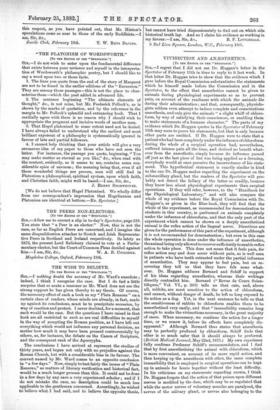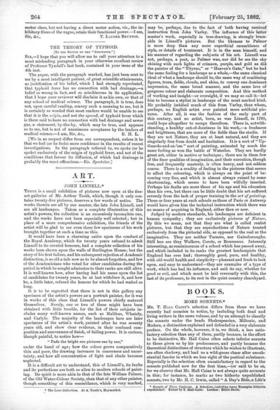VIVISECTION AND ANESTHETICS.
[To THR EDITOR or nor ..spscrwroa.°] SIR,—I regret that I did not see Dr. Hoggan's letter in the Spectator of February 11th in time to reply to it last week. In that letter Dr. Hoggan tries to show that the evidence which I gave before the Royal Commission substantiates the statements which he himself made before the Commission and in the Spectator, to the effect that anaesthetics cannot be given to animals during physiological experiments so as to prevent pain, on account of the readiness with which the animals die during their administration; and that, consequently, physiolo- gists seldom even attempt to induce complete and conscientious
anaesthesia, and only give the animals " a slight whiff of chloro- form, by way of satisfying their consciences, or enabling them
to make statements of a humane character." The parts of my evidence which Dr. Hoggan quotes in the Spectator of February 11th may seem to prove his statements, but that is only because other parts are omitted. If Dr. Hoggan were to state that a patient who had been completely Under the influence of chloroform during the whole of a surgical operation had, nevertheless, suffered intense pain all the time, and derived no benefit what- ever from the =esthetic, simply because its influence passed off just as the last piece of lint was being applied as a dressing, everybody would at once perceive the incorrectness of his state- ment. This hypothetical statement is exactly similar in kind to the one Dr. Hoggan makes regarding the experiment on the submaxillary gland, but the readers of the Spectator will pro- bably not detect the fallacy of the latter so readily, because they know less about physiological experiments than surgical operations. If they will refer, however, to the "Handbook for the Physiological Laboratory," and will also compare the whole of my evidence before the Royal Commission with Dr. Hoggan's, as given in the Blue-book, they will find that the whole of the experiment, as recommended for demonstration to students in this country, is performed on animals completely under the influence of chloroform, and that the only part of the experiment which cannot be shown on a deeply anaesthetised animal is the reflex action of the lingual nerve. Directions are given for the performance of this part of the experiment, although it is not recommended for demonstration ; but even in this case the whole operation is done under the influence of ana3sthetics, the animal being only allowed to recover sufficiently to enable reflex action to take place. This does not mean that it feels pain, for reflex action may and does occur without pain, as is well seen in patients who have teeth extracted under the partial influence of anaesthetics. They may appear to feel pain, but on re- covering they tell us that they have felt none what- ever. Dr. Hoggan adduces Bernard and Schiff in support of his ideas regarding anaesthetics, whereas their writings directly contradict him. Bernard (" Revue de Courts Scien- tifiques," Vol. VI., p. 263) tells us that cats, and, above all, rabbits, are most sensitive to the action of chloroform, and cannot, without danger of death, be left so long exposed to its action as a dog. Yet, in the next sentence he tells us that the sensitiveness of rabbits to chloroform enables them to be anaesthetised very easily, and that " insensibility remains long enough to make the vivisection necessary, in the great majority of cases. When necessary, we continue the action for a longer time, or we renew it, before its effects have completely dis- appeared." Although Bernard thus states that anaesthesia may be perfectly produced by chloroform, Schiff finds that ether is so much safer that it should always be preferred. (British, Medical Journal, May 22nd, 1875.) My own experience fully confirms Professor Schiff's recommendation, and I find
that by first anaesthetising the animal with chloroform, which is more convenient, on account of its more rapid action, and then keeping up the auresthesia with ether, the same complete insensibility that is employed in surgical operations can be kept up in animals for hours together without the least difficulty. In his criticisms on my statements regarding curare, I think Dr. Hoggan forgets that the action of that poison upon different nerves is modified by the dose, which may be so regulated that while the motor nerves of voluntary muscles are paralysed, the nerves of the salivary gland, or nerves also belonging to the
motor class, but not having a direct motor action, viz., the in- hibitory fibres of the vagus, retain their functional power.—I am,



































 Previous page
Previous page